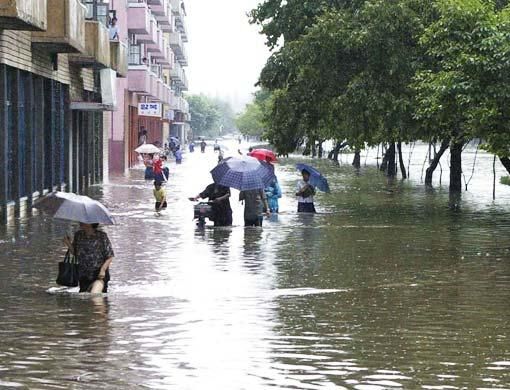Seoul: Floods caused by the largest rains ever recorded in parts of North Korea have destroyed more than one-tenth of the impoverished country's farmland at the height of the growing season, official media reported yesterday.
The UN food agency estimated the damage claimed by the North so far was about a quarter of the crop losses the country said it suffered in 1995 floods.
That previous disaster, along with mismanagement of the economy and the loss of Pyongyang's Soviet benefactor, led to famine that is believed to have killed as many as 2 million North Koreans.
Precipitation along some areas of the Taedong River were the "largest ever in the history" of measurements taken by the country's weather agency, the North's Korean Central News Agency reported. "It is hard to expect a high-grain output owing to the uninterrupted rainstorms at the most important time for the growth of crops," KCNA said.
The amount of detail given in official reports on this year's storms by the secretive North appeared to indicate the desperation of the regime and amount to a cry for help from the outside world.
The damage has submerged, buried or washed away more than 11 per cent of rice and corn fields in the country, KCNA reported, citing Agriculture Ministry official Ri Jae Hyon.
"The damage to farm crops by the current torrential rains is heavier than the previous ones in our country," Ri was quoted as saying. The rain was worse than downpours that battered the country 40 years ago, KCNA reported, noting the total rain from August 7-11 averaged 524 millimeters, 52 millimeters more than in the previous disaster in that same month in 1967.
The North is especially susceptible to bad weather because of a vicious circle where people strip hillsides of natural vegetation to create more arable land to grow food - increasing the risk of floods. North Korean state media earlier said the summer storms that battered wide swathes of the country left "hundreds" dead or missing, and other aid officials have said the toll was at least 200.
The UN World Food Program estimated based on its previous surveys that the amount of damage the North Koreans claimed to its fields, if confirmed, would result in losses of about 450,000 tonnes of crops - nearly half of the 1 million ton annual shortage the country already faces. Still, the amount is less than the total 2 million tonnes the North said were lost in 1995 floods.












